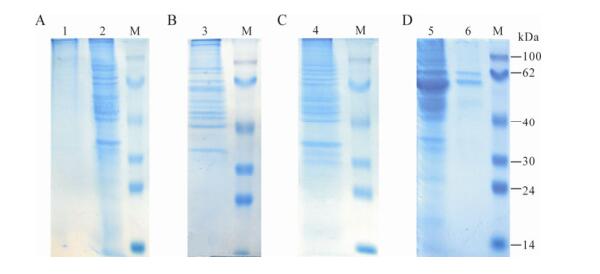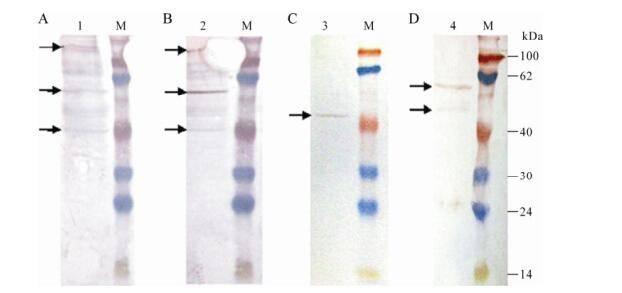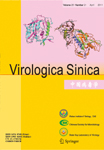-
Canine distemper virus (CDV) is an important pathogen for Canidae, Mustelidae, Felidae, Procyonidae, Viverridae, Ailuropodidae, Ursidae, Scrofa and even Macaca [9, 13]. Vaccination is an effective measure to control canine distemper in dogs and wild carnivores. For this purpose, several attenuated live vaccines made from cell culture or chicken embryos are often used. Despite that any newly developed vaccine would likely be produced by reverse genetics and carry well-defined attenuated mutations, traditional embryo-adapted live vaccines still take advantages of lower costs and better safety than those from cell culture, especially in wild animals (for example, CDV vaccine), and in human (for example, measles virus (MV) vaccine and rabies virus vaccine).
CDV uses the hemagglutinin protein to bind its cellular receptors [14]. Two CDV receptors, CD150 in lymphocytes [11] and heparin sulfate (HS) in 293 cells [2], have been reported. CD150, also named the signaling lymphocyte activation molecule (SLAM) with a predicted molecular weight of 37 kDa, is a preferential receptor for all members of the Morbillivirus genus. Vero-DST, a Vero cell line stably transfected with canine CD150, has been chosen for more effective isolation of CDV from clinical specimens [7]. However, mechanisms of viral cross-species adaption to chicken embryos or chicken embryo fibroblasts (CEF), as well as corresponding cellular receptors for such animal viruses as CDV and MV remain unclear. We previously reported that an isolate of CDV from an immunized but diseased pet dog, designated as CDV Kunming strain(CDV-KM), could replicate in CEF [5]. Receptors involved in its adaptive infection were subsequently investigated by virus overlay protein blot assays (VOPBA).
HTML
-
CDV-KM strain was propagated in monolayer Vero cells in Dulbecco′s Modified Eagle Medium (DMEM) (Invitrogen Gibco, USA) with 5% new-born calf serum (NCS). When massive cells produced a cytopathic effect, the cells were frozen and then thawed twice to harvest supernatant by low speed centrifugation. The virus was purified with differential centrifugation by 5 500 ×g for 60 min at 4℃. Twenty milliliters of the resulting supernatant was preserved at -70℃ for use in subsequent VOPBA and determined for their median tissue culture infection dose (TCID50) in Vero cells with endpoint dilution assay (Reed-Muench method). The remainder of the supernatant was further centrifuged with an OptimaTM LE-80K ultracentrifuge (Beckman Coulter, USA) by 35 000 ×g for 60 min at 4℃ to collect virus sediment, which was then resuspended with ddH2O and quantified for its protein content with ultraviolet spectrometry. CEF were prepared as usual from 8-day embryos of the Ross breed of chicken (Kunming Chia Tai Co. Ltd, Kunming, China) and cultured in DMEM with 10% NCS for 24 h before use.
Antisera against CDV-KM strain were collected from 5 male mice of Kunming breed (Experimental Animal Center, Kunming Medical College, Kunming, China) subcutaneously immunized twice with the purified virus at a dose of 35 μg each, which was premixed with equal volume of freshly made aluminum hydrate colloid. The mice were sacrificed according to the relevant guidelines on animal rights of the Chinese Association for Laboratory Animal Sciences. The mixed antisera were treated with 1% (W/V) acetone-dried Vero cell powder and then determined for their titers by indirect dot-enzyme linked immunosorbent assays (dot-ELISA) on nitrocellulose membranes (Osmonics Inc., USA) with goat anti-mouse horseradish peroxidase (HRP)-conjugated IgG (Boster Bioengineering Inc., Wuhan, China) as a second antibody and by microplate neutralization tests (MNT) with 100 TCID50 of virus finally added in each well.
-
Three methods were employed to extract the membrane proteins of CEF. 1) A Mem-PER eukaryotic membrane protein extraction kit (Lot#KB0088, Pierce, USA) was used according to the manufacturer's instructions. 2) A radioimmunoprecipitation assay (RIPA) buffer (pH7.5) (50 mmol/L Tris-HCl, 1.0 mmol/L EDTA-Na2, 150 mmol/L NaCl, 2% Triton X-100, 1% sodium deoxycholate plus 1.0 mmol/L PMSF) was added to lyse CEF by 20~25 µL/cm2 and the flasks were kept on ice for 30 min with occasional shaking. Supernatant after centrifugation was collected for protein analysis. Vero cells as control were treated in the same way. 3) A modified co-immunoprecipi-tation was used. In brief, CEF were inoculated with CDV at a ratio of 2×105 TCID50/cm2 and incubated for 10 min at room temperature before viral liquid was discarded. The CEF were immediately washed twice with 4℃ precolded D-Hanks solution, followed by adding RIPA buffer without sodium dodecyl sulfate, and the flasks were promptly put on ice and kept for 30 min. Supernatant from the cell lysates after centrifugation was incubated with mouse antisera at a ratio of 100:1 (V/V) for 30 min at room temperature and then with 200 μL recombinant Streptococcal protein A (rSPA)-Sepharose (Putus Macromolecular Sci. & Tech. Ltd, Wuhan, China) slowly shaken for 45 min on ice. Pellets were washed 3 times with 50 mmol/L Tris-HCl buffer (pH7.6) and then treated with 50 μL of 0.1 mol/L glycine buffer (pH3.0) to release bound complexes.
-
The membrane extracts were analyzed using sodium dodecyl sulfate-polyacrylamide gel electro-phoresis (SDS-PAGE) in 12% separation gel (pH8.8) and VOPBA (similar to Western Blotting). In brief, the membrane proteins were mixed with equal volume of 2× reductive loading buffer and boiled for 5 min and then, together with a prestained protein marker (Lot#D31225, TransGen Biotech Inc., Beijing, China), subjected to SDS-PAGE. The gels were stained with 0.25% Coomassie brilliant blue R-250 and then decolored for observation, or directly used to transfer proteins to nitrocellulose membranes (pore size 0.45 μm) for 2.5 h at 100 V with a DYCZ-40D electric transferrer (WoDeLife Sciences Instrument Company, Beijing, China). The nitrocellulose membranes, temporarily stained with 0.2% ponceau S as necessary for checking protein transfer efficiency, were blocked with 5% skimmed milk powder in Tris base salt buffer (pH7.4) with 0.05% Tween-20 (TBST), then incubated with TBST-diluted virus (V/V=1:2), mouse antisera (1:100) and goat anti-mouse HRP-conjugated IgG (1:1 000) for 1 h at room temperature, washed 3 times with TBST at each interval, and finally dyed with 0.6 mg/mL DAB-4HCl containing 0.03% CoCl2 plus a drop of H2O2.
Cell culture, virus purification and antisera pre-paration
Membrane protein extraction
Membrane protein analysis
-
CDV preserved as Vero cell culture supernatant reached a titre of 105.8 TCID50/mL. Protein content of ultracentrifugally purified CDV was 1.033 mg/mL. In dot-ELISA, antisera (1:200) collected from the CDV-immunized mice displayed a positive reaction with the virus but not with the lysates of Vero cells (Fig. 1). In MNT, the median protective dose (PD50) of the mouse antisera was 1:52.

Figure 1. Titration on mouse antisera against canine distemper virus (CDV) with indirect dot-enzyme linked immunosorbent assay (dot-ELISA). 1 and 3, Purified CDV; 2 and 4, Lysates of Vero cells. The nitrocellulose membranes were coated in their circled spots with purified CDV or lysates of Vero cells, blocked with 5% skimmed milk powder and then incubated with nonimmume sera as control (A) or anti-CDV sera (B) (both at 1:200), respectively. Goat anti-mouse horseradish peroxidase (HRP)-conjugated IgG (1:1 000) was used as a second antibody.
-
SDS-PAGE showed largely similar patterns of mem-brane proteins extracted with Mem-PER kit or RIPA buffer and there were many protein bands in the extracts (Fig. 2A, 2B and 2C). Incubation of the mixture containing CEF membrane proteins, CDV and mouse anti-CDV sera with protein A-sepharose markedly improved extraction of CEF membrane proteins, resulting in several clearly defined protein bands (Fig. 2D).

Figure 2. Analysis on membrane proteins of CEF (A, B and D) or Vero cells (C) by SDS-PAGE. M, Blue Plus II Protein Marker; 1, Hydrophobic fraction of CEF membrane proteins extracted with Mem-PER kit; 2, Hydrophilic fraction of CEF membrane proteins extracted with Mem-PER kit; 3, CEF membrane proteins extracted with radioimmunoprecipitation assay (RIPA) buffer; 4, Vero cell membrane proteins extracted with RIPA buffer; 5, supenatant from rSPA-Sepharose treated mixture containing CEF lysates, CDV and mouse anti-CDV sera; 6, putative CEF receptor-virus-antibody ternary complex eluted with glycine buffer (pH3.0).
-
In contrast to relatively few proteins found by SDS-PAGE in the hydrophobic fraction of CEF using the Mem-PER kit (Fig. 2A), there were 3 positive bands in the hydrophilic fraction by VOPBA with a molecular weight of 40, 57 and 120 kDa, respectively (Fig. 3A). When treated with RIPA buffer, the same 3 protein bands appeared in CEF (Fig. 3B) and one definite band at 42 kDa in Vero cells (Fig. 3C). Two protein bands in the complex eluted from the rSPA-Sepharose were detected as positives by VOPBA and had a molecular weight of 48 and 57 kDa, respectively (Fig. 3D).

Figure 3. Virus overlay protein blot assay (VOPBA) on membrane proteins extracted from chicken embryo fibroblasts (CEF) (A, B and D) or Vero cells (C). M, Blue Plus II protein marker; 1, Hydrophilic fraction extracted from CEF with Mem-PER kit; 2, Membrane proteins extracted from CEF with radioimmunoprecipitation assay (RIPA) buffer; 3, Membrane proteins extracted from Vero cells with RIPA buffer; 4, Putative CEF receptor-virus-antibody complex eluted from recombinant streptococcal protein A (rSPA)-Sepharose with glycine buffer (pH3.0).
Mouse antisera positively reacted with CDV
Affinity bead capture improved extraction of membrane proteins
VOPBA revealed one common positive protein band in CEFs
-
Unlike avian viruses, most animal viruses can not effectively infect chicken embryos or their fibroblasts. However, some strains of Morbillivirus members that have been successfully grown in cell cultures could further adapt to embryos or CEF. It is possible that common biochemical pathways or cellular receptors may exist in both cell cultures and CEF. The special environment inside CEF in a fast proliferation state is generally speculated to be a decisive factor but is not well understood. Undoubtedly, particular receptors on cellular membrane of CEF for such animal viruses as CDV are inevitably involved in initiation of infection and subsequent adaption. In addition, mutation of viral genes may be a mechanism for adaption to CEF. It was found that swine influenza virus changed individual amino acid residues of its hemagglutinin protein so as to bind and utilize a preferential receptor in CEF with a higher efficiency [10].
The CDV-KM strain was previously found to be capable of causing hemorrhagic spots on chorioallantoic membrane. Nevertheless, unlike the extensive cytopathic effect in Vero cells, the CDV-KM strain only gave rise to a locally limited cytopathic effect in CEF. It was reported that slow replication of MV (Schwarz strain) in CEF was due to poor utilization of an unknown receptor other than CD46 in Vero cells [1]. Considering the close relationship between CDV and MV, it seems that CDV might use a mechanism similar to that MV used or even the same cellular receptor in CEF. For example, it has been accepted that CD150 in lymphocytes acts as a prior receptor shared by CDV and MV [11, 12].
-
In this research, three methods were employed to isolate and identify cellular receptors for CDV. Dot-ELISA and VOPBA showed positive reactions or bands (Fig. 1 and Fig. 3), indicating eligible preparation of mouse anti-CDV sera. A low value of PD50 of the antisera may be caused by broken or degraded hemagglutinin protein during the virus purification process that is a consequence of the fragile virus envelope and is responsible for eliciting neutralizing antibodies [4]. To reduce possible non-specific reactions, the antisera were preabsorbed with acetone-dried Vero cell powder.
Membrane proteins of CEF extracted with the Mem-PER kit or the RIPA buffer resulted in the same 3 positive hydrophilic bands by VOPBA (Fig. 3A and 3B). Water solubility of cellular receptors might change owing to unknown reasons in the course of the membrane protein extraction despite the fact that receptors in membranes tend to be hydrophobic in their natural state. Interestingly, Vero cells as control gave a 42-kDa band that differed from the 3 bands in CEF and also from those reported by Guo et al [3] (Fig. 3C). Whether the 42-kDa protein corresponds to that reported by Singethan et al [8] needs to be confirmed.
In order to eliminate the background stain from the CEF membrane extracts in these two methods, a modified co-immunoprecipitation method was carried out. Incubation of CDV with CEF for only 10 min was intended to help the live viruses be in an ideal state of binding their cellular receptors before entry, and the lysis buffer containing such mild detergent as Triton X-100 and sodium deoxycholate but not SDS con-tributed to keeping putative receptor-virus-antibody complex intact until elution from rSPA-Sepharose. VOPBA revealed two positive bands, the heavier one of which had the same molecular weight as that detected in Mem-PER kit or RIPA buffer treated CEF, demonstrating that the 57-kDa protein could be a receptor in CEF for CDV (Fig. 3D) although the possibility that the other positive protein bands detected in this research act as cellular receptors for CDV can not be completely ruled out.
It has been reported that CDV utilized CD150 to infect lymphoid cells and heparin sulfate to infect human 293 cells and as well as an unknown receptor to infect Vero cells [8]. The 57-kDa protein in CEF and the 42-kDa protein in Vero cells, which were unlike CD9 [6], could directly bind CDV in VOPBA. Our findings here strengthen the perspective that there exists a diversity of cellular receptors for CDV, which is consistent with its wide host range. Of course, a final identification of the two proteins discovered in this research depends on receptor reconstruction and infection blocking tests in naturally nonsusceptible cells, or development of a receptor-binding-deficient hemagglutinin protein or another CDV strain bearing such protein as control, which requires additional work.













 DownLoad:
DownLoad: